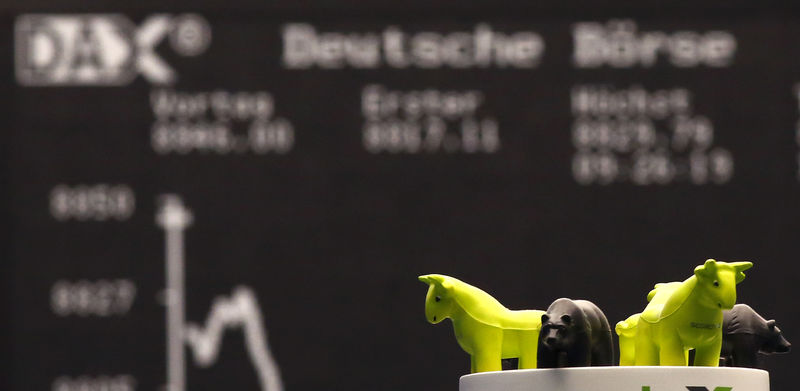This post was originally published on this site

Investing.com – European stock markets are expected to open lower Monday in cautious trading at the start of a holiday-shortened week, with investors digesting French political uncertainty, an upcoming ECB policy-setting meeting as well as the ongoing Ukraine conflict.
At 2:05 AM ET (0605 GMT), the DAX futures contract in Germany traded 0.3% lower, CAC 40 futures in France dropped 0.4% and the FTSE 100 futures contract in the U.K. fell 0.2%.
Sunday saw the results of the first round of the French presidential election, with French leader Emmanuel Macron and far-right challenger Marine Le Pen qualifying for the election runoff on April 24.
A Le Pen victory could send shockwaves through Europe given her anti-European Union stance. Opinion polls predict a very tight battle in the second round, with Macron just ahead but his lead within the margin of error.
The European Central Bank is set to hold its latest policy-setting meeting on Thursday, and investors will be looking for guidance of future monetary policy with Eurozone inflation running at a record high 7.5% and showing no signs of peaking.
Policymakers will be reluctant to tighten policy amid uncertainty over the impact of the war in Ukraine on the bloc’s economy, but the more hawkish members of the ECB’s governing council will continue to push for interest rate hikes this year.
Elsewhere, the war in Ukraine continues, with Austrian Chancellor Karl Nehammer set to meet Russian President Vladimir Putin later Monday in Moscow. This would be the Russian leader’s first face-to-face meeting with a European Union counterpart since he ordered the invasion of Ukraine in late February.
U.K. economic growth moderated in February, with GDP climbing 0.1% on the month, a drop from the 0.8% increase seen the previous month.
In corporate news, the German car industry is likely to be in the spotlight after BMW’s (DE:BMWG) CEO Oliver Zipse said, in an interview with newspaper Neue Zürcher Zeitung published on Monday, that a shortage of semiconductors is likely to remain a problem for the industry into 2023.
Oil prices fell Monday, continuing recent weakness as China’s lockdowns continue as it COVID outbreak worsens, weighing on demand from the world’s largest crude importer.
Shanghai reported over 26,000 new COVID cases on Sunday, a new record, illustrating the difficulty the country has had stopping the spread of the highly infectious omicron variant despite lockdowns and repeated mass testing.
With China maintaining its COVID Zero strategy, there is no clarity over when these lockdowns will be lifted, and thus when this economically important region can return to full output.
By 2:05 AM ET, U.S. crude futures traded 1.8% lower at $96.47 a barrel, while the Brent contract fell 1.7% to $101.04. Both benchmarks dropped over 1% last week, the second consecutive losing week.
Additionally, gold futures fell 0.2% to $1,941.10/oz, while EUR/USD traded 0.1% higher at 1.0888.


